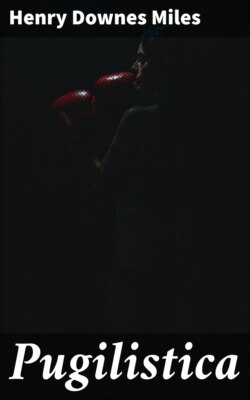Читать книгу Pugilistica - Henry Downes Miles - Страница 7
На сайте Литреса книга снята с продажи.
Оглавление“Presented
By Public Subscription to
THOMAS WINTER SPRING,
EX-CHAMPION OF ENGLAND,
In Testimony of the Sincere Respect in which he is held
For his Pure and Honourable Conduct
During his Long and Unblemished Career
In Public and Private Life.
1846.”
After an excellent dinner (on Tuesday, May 19, 1846), presided over by the editor of Bell’s Life in London (Vincent George Dowling, Esq.), the Chairman took occasion thus to allude to the letters of various distant subscribers: “Every letter he had seen bore testimony to the public and private worth of Spring, and spoke of him as a man whose unblemished integrity, benevolence of heart, urbanity of disposition, and unquestionable courage, entitled him to the highest praise. In all and every of these sentiments he concurred. From the first hour he had known him he had watched his conduct, and he could conscientiously say that in his opinion a more honest or a more high-principled man did not exist. But in whatever light he might regard this testimony towards Spring, it had a higher value in his eyes, as being the representative of those sentiments of admiration with which the feelings of honour and honesty were regarded by every class of the community. It was a proof that such qualities were not overlooked, and he only regretted that every pugilist in England could not be assembled in that room to witness the fruits of a career distinguished by these virtues, as it would afford them the best encouragement to persevere in the same course, and probably elicit similar marks of favour.” After some further laudatory remarks, the Chairman presented the testimonial, with an earnest belief that it would be received with becoming sentiments of gratitude, and in the hope that Spring might long live to see it grace his table, in addition to his other cups, as a sterling representative of his merits, and of the sincere respect to which he had entitled himself.
After a short pause Spring rose, almost overpowered by his feelings. He knew not, he said, how to express in words the overflowing sentiments of gratitude with which his heart was bursting. He had certainly endeavoured through life to steer the straight-forward and honest course, and when he looked inwardly he could not charge himself with ever having given ground for shaking the confidence of his friends (hear). Still he could not persuade himself he was better than other men, or that he had entitled himself to this magnificent token of public favour—for public it was, arising as it had from the spontaneous contribution of a large and mixed portion of his countrymen—to whom he could not say how sincerely he was obliged, or how deeply sensible he was of their munificent liberality. When he received the cup presented to him at Manchester, and subsequently that given to him by his friends in Herefordshire, both of which were then on the table, and when to these were added other tokens, less in value, but not less dearly appreciated, he could not but feel proud; but when these were followed by the testimonial now presented to him, he candidly confessed the fondest wishes of his ambition had been realised. He should indeed cherish it with a becoming sense of its intrinsic and representative value, and would, in the closing years of his life, look back to this day as one of surpassing interest to himself and to all those who were dear to him. Here Spring could no longer sustain his self-possession, and placing his hand on the tankard with deep emotion, he concluded by saying, “I can only thank you, and all else I might say I must leave to your own hearts to imagine.” (Loud and continued cheers.)
Caunt, Ned Neale, Frank Redmond, Johnny Broome, Owen Swift, Dan Dismore, Joe Phelps, etc., were among the pugilists present; and Mr. Sant, one of the earliest backers and a constant friend of Tom Spring, after a warm eulogy on mine host, proposed “The Subscribers to the Testimonial.”
TOM SPRING’S MONUMENT IN NORWOOD CEMETERY.
From this period to that of his death, on the 20th of August, 1851, Spring dispensed the hospitalities of the Castle, never losing a friend, except by the hand of death. In his later days, family difficulties, and too great a confidence in self-styled friends, who induced him to execute turf commissions, and when the thing went wrong were absentees or defaulters, added to his embarrassments. Still he held on, universally respected by all who knew him until his 56th year, when pale death struck him down somewhat suddenly, the blow being dealt through a heart disease of some years’ standing. His funeral took place with becoming solemnity on Sunday, the 25th of August, 1851, his remains being followed by several mourning coaches and other carriages to the grave. In the first carriage were his only surviving son, Melchior Winter; Mr. Price, of Hereford, his solicitor and executor; his firm friend, Mr. Elbam, of Piccadilly; and the writer of these pages. Poor Tom lies buried in the Norwood Cemetery, beneath the monument which we have here engraved. “Peace be to his manes!” Few men who have led a public life have less reason to dread the last call of “Time,” than Thomas Winter Spring.
